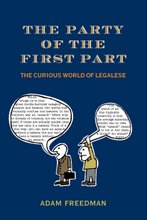
As we reported recently (see "Holster that Comma," below), there's a comma war brewing as the Supreme Court gears up to hear its first Second Amendment case in nearly 70 years.
In today's New York Times, yours truly weighs in on the punctuation and grammar of the most tortured sentence in the Bill of Rights. Take a look - if you like the article, please email it on to a friend! (At the time of posting, the column is #4 in the "most emailed" category at NYT).
In today's New York Times, yours truly weighs in on the punctuation and grammar of the most tortured sentence in the Bill of Rights. Take a look - if you like the article, please email it on to a friend! (At the time of posting, the column is #4 in the "most emailed" category at NYT).

